Examining Curses in the Harry Potter Universe
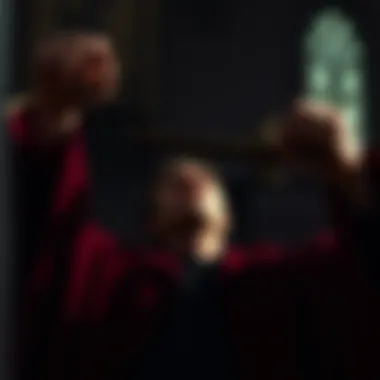
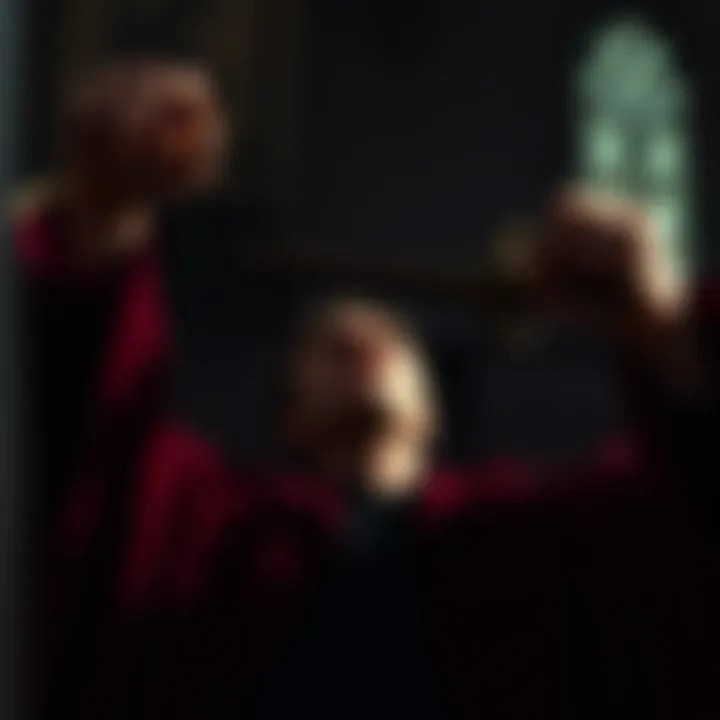
Intro
Curses in the Harry Potter universe are more than mere spells; they weave intricate tales that shape the fates of beloved characters and the direction of the narrative. From the simple jinxes that cause playful mischief to the dark and unforgiving unforgivable curses, these magical incantations serve as instruments of conflict, growth, and moral challenges. Each curse offers a glimpse into the emotions and motivations of its wielder, revealing the complexity of wizarding ethics and the consequences of wielding such power. The significance of curses extends beyond their immediate effects; they embody deeper themes that resonate across the series.
Throughout this exploration, we will dissect the myriad forms of curses, tracing their origins and understanding their classifications. We aim to illuminate key instances where curses have dramatically altered character arcs or pivotal plotlines, such as the impacts of Severus Snape's curses during his tumultuous childhood or the long shadows cast by Voldemort's malevolence. By examining these elements, readers will gain insights into how curses permeate the fabric of the magical world, ultimately contributing to the larger narrative.
As we navigate through this intriguing subject, we will also delve into the moral dilemmas entwined with the utilization of these potent spells. The ethical implications of casting a curse often reflect the internal struggles faced by characters, pushing them into corners where they must confront their values and beliefs. The interplay between character choice and consequence will be a focal point in our discussion, showing how these themes resonate not just within the pages of the books, but in the broader context of human behavior.
By the end of this article, readers will emerge with a richer understanding of the complexities surrounding curses in the Harry Potter universe, providing a refreshed lens through which to view the enchanting yet perilous world crafted by J.K. Rowling.
Curses: An Overview of Magic
Curses stand as a cornerstone of magic in the Harry Potter universe, representing the darker side of wizardry. They encapsulate the complex interplay between magic and morality, serving as a reflection of the choices made by witches and wizards. By exploring curses, we peel back layers of character motive, historical significance, and thematic depth, enriching our understanding of the narrative landscape crafted by J.K. Rowling.
This journey into curses allows readers to grasp more than just spellcasting. It prompts a deeper examination of intention behind the magic, tapping into the ethical quagmire that arises when power meets reason. Ultimately, curses are not merely spells but instruments of transformation—shaping not just the characters but the entire fabric of the story.
Definition and Nature of Curses
In the realm of magic, curses are typically classified as spells intended to inflict pain, suffering, or even death upon the target. However, defining a curse isn't just about the action; it also encompasses the intent behind it. A curse isn't merely a brute force of magic but a considerable weight of ethical considerations. For instance, the Cruciatus Curse, designed to induce excruciating agony, is not just a spell but a commitment to cruelty. It reveals the darker impulses that reside within those who wield it.
Curses also range in complexity from simple hexes—such as the Bat-Bogey Hex, which evokes a rather humorous but harmless result—to more invasive and destructive spells that dominate the victim’s will or even end their life. The distinction lies significantly in their intended effects. To call a spell a curse requires an acknowledgment of its malevolent intent; thus, every curse becomes a mirror of the caster's character.
Historical Context of Curses in Wizardry
Delving into the historical aspects of curses transports us back to a time when wizardry was entwined with folklore and ancient beliefs. Historically, curses were not just whimsical magic tricks but were taken seriously in many cultures, often associated with folklore or supernatural retribution. The fear of curses often dictated behavior and practices, reflecting social norms and moral values.
In J.K. Rowling's wizarding world, historical knowledge plays a crucial role in shaping the current understanding and application of curses. Characters like Hermione Granger often consult historical tomes, illustrating the necessity of knowing the past to navigate the present. Consider this quote:
"The past is a prologue to the future; nothing is as it seems in a world where curses wield power."
Thus, the historical context reveals how the legacy of curses influences the responses of modern characters, serving as both a warning and a source of lore that adds texture to the magical narrative.
Moreover, curses have evolved alongside the wizarding community's understanding of morality and ethics. What once may have been a common knowledge could lead to fatal consequences today, as seen in the rigorous laws governing dark magic. This evolution of curses serves as a reflection of societal shifts and the ongoing dialogue about responsibility and terminal consequences in the magical community.
Classification of Curses
The classification of curses in the Harry Potter universe serves as a fundamental framework for understanding the complexities of magic. It goes beyond just naming spells and delves into the intent, consequences, and effects on wizards and Muggles alike. By categorizing curses, we can develop deeper insights into the moral implications and practical applications of magic throughout the series.
Understanding the classification allows readers and fans to appreciate how curses shape character arcs, plot progressions, and the very fabric of the wizarding world. Each type of curse brings its own nuances to interactions, pushing characters to the brink and sometimes bringing about transformative experiences. More importantly, this classification sheds light on how curses—whether dark or minor—play a pivotal role in the morality of wizarding society.
Dark Curses vs. Simple Hexes
When discussing curses, it is essential to distinguish between dark curses and simple hexes. Dark curses are typically malevolent in nature, aimed at causing harm to others, while the latter are more benign and often playfully used. For example, the Avada Kedavra curse, an unforgivable spell, is a dark curse characterized by its lethal outcome. On the other end of the spectrum, a simple hex like the Bat-Bogey Hex merely causes a person's bogeys to grow into bats, resulting in some amusement but no true harm.
Dark curses, such as those encountered in the battle between good and evil, often stem from a perilous mindset. They carry a weight that can shatter lives, splinter friendships, and define the darker shades of wizardry. In contrast, simple hexes reveal a more playful approach to magic, promoting light-heartedness in social interactions and showcasing the creativity of young wizards.
Severity and Impact of Curses
The severity of a curse determines its impact, both physically and emotionally, on the person afflicted. Curses can range from merely annoying, like a Tickling Charm, to devastating, such as the Cruciatus Curse, which inflicts excruciating pain.
A study of effects often reveals patterns about character development and motivation.
- Psychological Toll: The emotional strain from curses can lead to significant changes in behavior and outlook. For instance, survivors of the Cruciatus Curse, like Neville Longbottom’s parents, suffer a fate worse than death, showcasing the curse's impact beyond mere physicality.
- Social Dynamics: The repercussions of a curse can also shift relationships. Characters may become isolated or empowered depending on how they respond to the affliction. The interplay of curses can introduce themes of resilience, revenge, or even redemption.
Notable Curses in the Harry Potter Series
Throughout the Harry Potter narratives, numerous curses stand out due to their unique effects and the pivotal roles they play. Some of the noteworthy ones include:
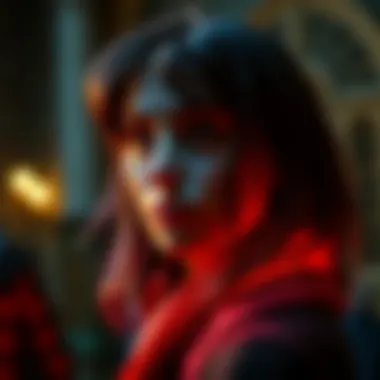
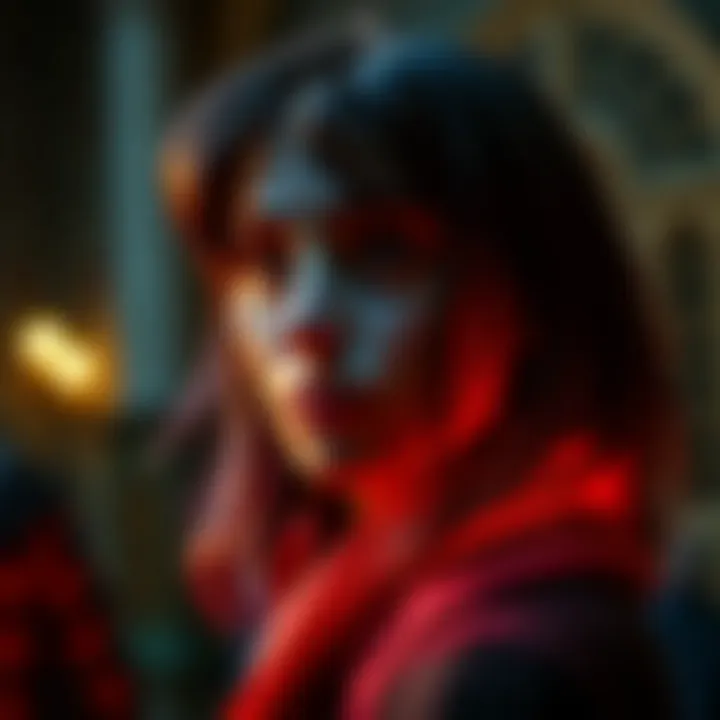
- Avada Kedavra: Known as the Killing Curse, it eliminates its target instantly, unreversibly affecting the lives of many. Witnesses of this curse are often left with lifelong trauma.
- Cruciatus Curse (Crucio): This excruciating curse tortures its victims, used primarily by Death Eaters. Its effects are not just temporary pain, but can lead to psychological scars.
- Imperius Curse (Imperio): This spell takes away the victim's autonomy, allowing the caster to control their actions completely. It showcases the ethical dilemmas of manipulation and free will.
In addition to these, minor curses like the Jelly-Legs Jinx provide depth to the lighter moments in the series. Even these seemingly trivial spells contribute to the overall atmosphere, highlighting the array of magical abilities available.
Key Curses within the Series
The concept of curses in the Harry Potter universe plays a pivotal role in shaping the darker nuances of magic within J.K. Rowling's writings. Curses are not just spells conjured for intrigue; they reflect the moral quandaries and ethical boundaries that characterize the wizarding world. This section will delve into key curses encountered throughout the series, illustrating their significance not only in terms of magical mechanics but also regarding character development, plot progression, and moral implications.
The Killing Curse: Avada Kedavra
Avada Kedavra, often termed the Killing Curse, stands as the most notorious among the Unforgivable Curses. This spell serves as a glaring example of the lethal capabilities magic can wield. When cast, it results in instant death, with no visible sign of struggle. Importantly, it holds profound moral and ethical weight, as it signifies the ultimate violation of life.
In the series, its use is often linked to themes of power and control. Characters like Voldemort employ it as a means to assert dominance over others, showcasing a brutal mindset devoid of empathy. Harry Potter’s encounters with this curse are particularly telling—he does not merely face the physical threat but also the philosophical implications of what it means to wield such power. The very act of using Avada Kedavra raises questions about the implications of choice, intent, and consequence.
The Cruciatus Curse: Crucio
The Cruciatus Curse, known as Crucio, serves a different purpose within the spectrum of curses. Its primary function is to inflict severe pain and suffering, effectively turning the victim's body into a vessel of agony. Unlike Avada Kedavra, which is swift and final, Crucio prolongs suffering, making it a tool of torment used by characters such as Bellatrix Lestrange and the Death Eaters.
The curse embodies the dark side of human emotion, particularly rage and vengeance. In the series, its impacts are not just physical; they delve into psychological torture as well. The lasting scars on individuals like Neville Longbottom exemplify the long-term implications of being subjected to such a curse. The Cruciatus Curse further nuances the portrayal of good vs. evil, presenting an unsettling reminder of how magic can be manipulated for sadistic ends.
The Imperius Curse: Imperio
In contrast to the other two, the Imperius Curse, or Imperio, represents the theme of control. This curse effectively allows the caster to dominate the will of another being, rendering them a puppet devoid of agency. Characters like Barty Crouch Jr. utilized it to manipulate significant figures within the wizarding world.
The ethical implications of Imperio highlight the loss of free will, raising uncomfortable questions about consent and autonomy. The series explores these themes primarily through the experiences of characters who have been cursed, such as Ron Weasley during the Battle of the Department of Mysteries. The mental toll of being manipulated leaves them grappling with feelings of guilt and helplessness, further intensifying the moral landscape of the series.
Other Noteworthy Curses
Beyond the three Unforgivable Curses, other notable curses arise within the narrative, each adding layers of complexity to the magical world. Spells like the Bat-Bogey Hex or the Jelly-Legs Jinx may appear trivial in comparison, yet they encapsulate the diversity of curses—ranging from humorous to menacing. These lesser-known curses also offer a glimpse into the cultural context of magic, revealing how wizarding society views and utilizes spells for both defense and offense.
In essence, key curses within the Harry Potter series not only serve as tools for plot advancement but also evoke profound reflections on morality, trauma, and the boundaries of magic. Each curse carries weight, shaping not only the characters who wield them but also the broader implications for the wizarding community. Understanding these iconic spells deepens our insight into Rowling’s universe, where every incantation comes with strings attached.
The Consequences of Curses
Understanding the consequences of curses within the Harry Potter universe offers a lens into the intricate web of character relationships and plot developments. Curses, with their potent magical abilities, don't just affect the target but also ripple through the wider wizarding community. They shape identities, testing the limits of morality and personal agency. This section unpacks how these spells contribute to the overarching narrative, looking closely at individual characters and the long-term effects they suffer.
Curses and Their Effects on Characters
Curses have a profound impact on the psyche and behavior of characters in J.K. Rowling's world. Take the example of Harry Potter himself, who faces several curses throughout his journey. Each encounter leaves a mark, shaping his identity and worldview.
- Emotional Trauma: Curses can instill fear, pain, and lingering trauma. For instance, those who suffer from the Cruciatus Curse experience residual psychological effects. This torment reflects on their actions afterward, leading to cynicism or even a desperate desire for revenge.
- Changes in Behavior: Encountering curses alters behavior significantly. Characters may turn more aggressive or defensive after being cursed. The fear associated with curses can lead characters like Hermione Granger to seek safer paths, reflecting on how the threat can motivate practical decisions.
- Development of Relationships: The relationships between characters are dynamically influenced by curses, often serving as catalysts for conflict or resolution. Secondary characters, such as Neville Longbottom, see pronounced growth when battling against curses, reshaping how the main trio interacts with him, and thus, redefining their internal groups.
Long-term Implications of Cursed Individuals
Curses leave marks that linger long after the magic has dissipated. The long-term ramifications can uproot a character's life, as seen with several prominent instances in the series.
- Physical Consequences: Some curses, like the Draught of Living Death, may not seem lethal but can have catastrophic long-term effects on health and well-being, as experienced by characters in critical moments.
- Social Isolation: Being cursed can lead to alienation. Take any instance of a character who's been cursed; they often find themselves marginalized, shunned by others who fear the consequences of association.
- Internal Conflict: Those affected often grapple with guilt and regret. Characters like Draco Malfoy illustrate how being a pawn in a broader scheme can leave one questioning their moral compass, and this introspection adds great depth to their narrative.
"Curses, while a defining aspect of magical dueling, become catalysts for personal evolution and moral reckoning."
Curses in the Harry Potter universe are not merely tools of magic; they are pivotal forces that shape the destinies of characters. As they navigate these dark waters, the lessons learned echo through their choices and relationships, ultimately influencing the larger narrative of good and evil that pervades Rowling's beloved series. Understanding these consequences is essential for grasping the interplay of magic, morality, and identity that drives the story forward.
Curses in Character Development
The concept of curses in the Harry Potter universe plays a significant role in shaping the personalities and trajectories of characters. These magical afflictions often serve as pivotal plot devices, driving character arcs and emphasizing their inner struggles as well as growth. Curses forced the characters to confront not only their vulnerabilities but also the moral implications of wielding such destructive magic. By understanding how characters respond to and learn from curses, readers can gain deeper insights into their motivations and transformations throughout the series.
Character Reactions to Being Cursed
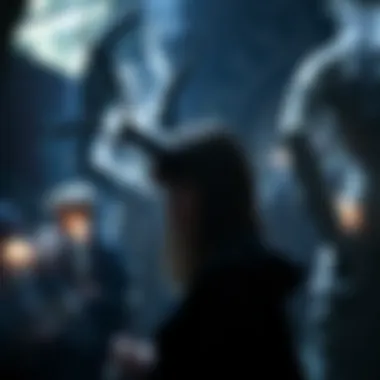
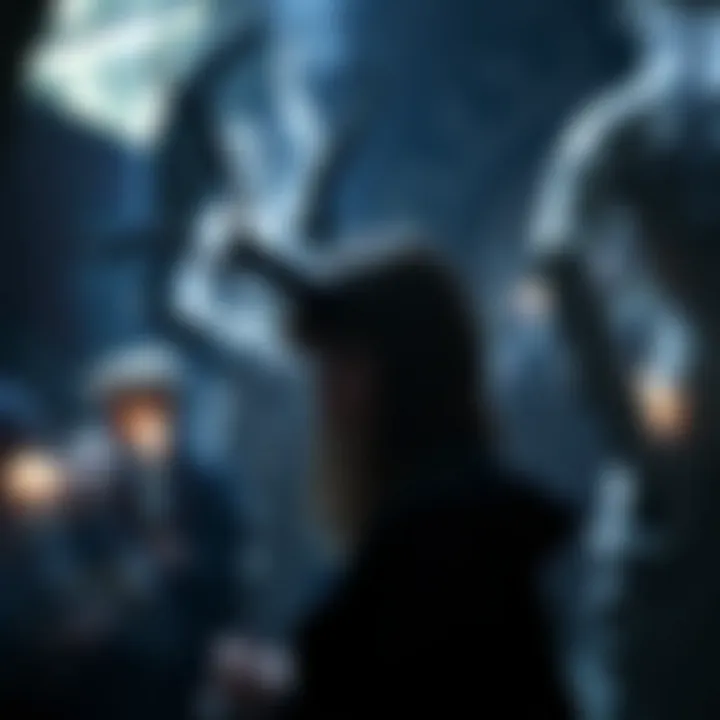
Curses evoke a range of emotional and behavioral responses from characters, showcasing their psychological resilience or, at times, their frailties. When faced with the heavy burden of a curse, a character's instinct may be to fight, flee, or bargain. For instance, when Harry Potter encounters the Cruciatus Curse (Crucio), he experiences intense pain, it’s not just physical pain; it's also an emotional ordeal that painfully reminds him of the tortures and horrors of war. His reaction to being cursed reveals his innate compassion and moral compass, even in the face of overwhelming suffering.
In contrast, there are other characters, like Bellatrix Lestrange, who revel in the act of cursing others. Her sadistic enjoyment of using the Cruciatus Curse on victims highlights a distinct psychological profile that stands in stark contrast to Harry's. Additionally, characters like Neville Longbottom showcase growth when subjected to curses—his initial fear transforms into courage, as he learns to fight back against those who would use such dark magic against his friends.
"Even in darkness, there is a flicker of light; how one reacts to being cursed reveals their true self."
These reactions create not only tension within the story but also allow for shifts in interpersonal dynamics among the characters, leading to alliances or enmities that are deeply rooted in their experiences with curses.
Transformative Experiences Induced by Curses
Curses also serve as catalysts for profound transformation in characters’ lives within the Harry Potter series. Being cursed can strip away the pretense and force characters to confront their true selves, sometimes igniting a dramatic shift in perspective. For instance, consider the impact of the Imperius Curse (Imperio) on characters like Harry and his friends. Under its influence, they experience a loss of agency that starkly contrasts with their usual autonomy, leading them to grapple with questions of morality, responsibility, and free will.
The moment when Harry finds himself under the Imperius Curse during the Triwizard Tournament is pivotal. It forces him to confront the vulnerability of losing control not just over his actions but also over his identity. The experience ultimately empowers him to establish his own will, strengthening his resolve in future encounters. This also leads to a deeper understanding of the struggle between good and evil, as Harry learns to resist the curse and emerge stronger.
Other characters, such as Ron Weasley and Hermione Granger, also undergo significant transformation when dealing with curses. Hermione, in particular, evolves through her encounters with spells like Petrificus Totalus. Her struggles with these curses help her develop not only tactical skills but also a sense of empathy for those who suffer from such magic.
In essence, curses in the Harry Potter universe act as both physical and psychological testaments of a character's strength or weakness, guiding them toward a transformation that contributes substantially to their personal growth and development.
Magical Countermeasures to Curses
Understanding the realm of curses in the Harry Potter universe is only half the battle; knowing how to counteract them is equally crucial. This section dives into the various magical countermeasures that witches and wizards utilize to fend off the negative effects of curses. The existence of counter-curses not only reflects the balance of power in the magical world but also offers character insight, shedding light on their skills and ethical dilemmas. The art of countering curses is intricately woven into the fabric of wizardry, showcasing both the cleverness and the caution exercised by those who walk a magical path.
Common Counter-Curses and Their Effectiveness
The world of magic is rich with counter-curses, each designed to neutralize specific dark spells. For instance, the spell Finite Incantatem serves as a general counter-spell to end ongoing charms or curses. This versatility makes it essential for witches and wizards, especially in times of distress when multiple hexes may be cast at once.
Another prominent example is Riddikulus, which specifically counters the Boggart, transforming it into something amusing, thus mitigating its fear-inducing effects. The efficacy of this counter-curse lies in its unique focus on confronting the core of the opponent's fears instead of merely dispelling the threat. Here’s a brief look at some other notable counter-curses:
- Episkey: Perfect for healing minor injuries caused by curses.
- Protego: A defensive spell that creates a shield, preventing curses from taking effect in the first place.
- Expecto Patronum: While not a counter-curse in the traditional sense, it can repel dark creatures like Dementors, which exemplifies how counter-measures can extend beyond just curses.
Not all counter-curses are foolproof, however. Their effectiveness often hinges on the proficiency of the caster and the strength of the original curse. For instance, while skilled wizards might easily fend off minor hexes, more complex spells like the Cruciatus Curse require extensive training and experience, making them challenging to counter. In this light, understanding which counter-curse to employ at a given time is essential for maintaining one's magical prowess.
The Role of Skilled Witches and Wizards in Cursing
Every magic user knows that skill is paramount when it comes to both casting and countering spells. Skilled witches and wizards are not only adept at performing complex spells but also play a significant role in the offense and defense surrounding curses. This duality of their capabilities creates an intricate dance of power where the same individual might wield both enhancement and deterrent magic.
In the context of curses, those who have honed their craft can often anticipate the moves of their opponents. For example, during duels, an experienced wizard might be able to quickly cast an effective counter-curse before receiving a spell's initial impact. Moreover, the reputation of famous wizards—like Albus Dumbledore, known for his strategic use of curses and remedies—illustrates the importance of wisdom alongside power.
Skilled practitioners are also responsible for innovating counter-curses. Hogwarts professors, such as Professor McGonagall, have often introduced their students to ingenious methods of warding off curses, ensuring the next generation is equipped with the knowledge required to defend against these dark arts. The clash between spells and counter-spells is not just a matter of brute strength but also a test of creativity and knowledge.
"The wizarding world continuously evolves; with each generation, new magic is discovered and new countermeasures created, making curses a living part of magical studies."
In essence, combating curses requires not just the right spells but also adeptness and strategy. The interplay between the casting of curses and the responses they elicit reveals deep insights into the characters’ relationships while showcasing a broader spectrum of magical competency within the Harry Potter universe.
Ethical Implications of Using Curses
Curses in the Harry Potter universe are not merely tools for magical conflict; they carry significant ethical weight. The choice to use a curse — be it for personal gain, vengeance, or even protection — raises questions about morality. Such magic is not just an extension of one’s power; it reflects deeper societal values and personal morals. Understanding the ethical implications is vital for delineating the boundaries between right and wrong in the wizarding world.
A central concern is the intent behind the use of curses. As they can range from mischievous hexes to unforgivable curses, the motives of those wielding such spells must be scrutinized. When looking at the actions of characters like Voldemort or Bellatrix Lestrange, it becomes glaringly obvious where ethical lines are drawn. They view curses as instruments of terror, showcasing how far one can spiral when driven by darkness. In contrast, characters like Harry Potter struggle with these choices; his initial hesitation to use the Cruciatus Curse against Bellatrix demonstrates an awareness of moral limits.
"The moral path is fraught with complexity; choosing to curse or not is less about the magic itself and more about the intentions that guide its use."
This highlights the notion that curses can serve as reflective surfaces for the wizard's character. The ramifications of using such magic extend beyond oneself, influencing relationships, reputation, and one’s standing within the community. The more one learns about the ethical landscape of curses, the clearer it becomes that these spells represent much more than arbitrary magic — they encapsulate moral dilemmas that resonate deeply in real-life contexts.
Morality of Cursing in Wizardry
When evaluating the morality of cursing in a magical society, one must grapple with the fundamental question: is it ever justified? The answer is often layered with complexity. For instance, cursing to defend oneself from imminent harm can be seen in a more favorable light than cursing someone without provocation. Yet, each instance of cursing must be contextualized within the layers of interpersonal dynamics and societal norms of that magical community.
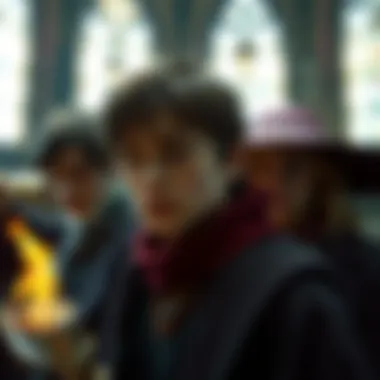

Curses like the Cruciatus Curse shed light on this moral conflict. Inflicting pain for pleasure exposes a darker side of wizardry, blurring the lines between right and wrong. Many consider such actions as despicable and counter to the very principles of empathy and respect that should guide wizardkind.
Furthermore, how one reacts to the victimization of others reveals a lot about their moral fiber. For instance, when Draco Malfoy is coerced into using the Cruciatus Curse, it sparks debate over peer pressure versus personal ethics. His internal conflict showcases that a wizard's choice to curse can often stem from societal influences rather than personal conviction.
The Fine Line Between Defense and Offense
In investigating the boundary between defensive and offensive cursing, we stumble upon an intricate web of ethics, intent, and consequence. Defensive cursing typically arises out of necessity, a wizard or witch responding to a threat. Yet, it's essential to differentiate between a justified defense and a vengeful attack disguised as self-preservation.
For example, consider Harry’s use of various counter-curses in battles. His focus remains on protection, emphasizing the instinct to safeguard rather than to harm. However, Harry and his peers recognize that even defensive curses can evolve into acts of aggression if not approached carefully. This highlights a crucial aspect of wizarding ethics: the thin line separating necessity from malice.
Moreover, as the series progresses, the notion of using curses as a last resort becomes increasingly prevalent. Characters like Hermione Granger advocate for peaceful resolutions, challenging the more aggressive instincts of their peers. The shift in how characters understand their magical actions illustrates a growing recognition of responsibility and morality in the wizarding world.
In summary, the ethical implications of curses raise significant reflections on human nature itself, making it a deeply engaging topic. It compels readers to consider their own moral compass and the broader implications of power, control, and responsibility in both wizardry and the real world.
For further information on this subject, you might explore:
- Wikipedia on Curses in Fiction
- Britannica's Exploration of Ethics
- Reddit Discussions on Curses
- Psychology of Morality
Understanding these ethical implications can take you on a journey through the tumultuous waters of magic, morality, and the intricate decisions that shape characters and their destinies.
The Cultural Reflection of Curses
Curses, particularly in the Harry Potter universe, serve not only as magical tools but also as mirrors reflecting the societal undercurrents of the times. The various curses exhibited through characters, story arcs, and conflicts encapsulate prevailing fears, moral dilemmas, and cultural beliefs. This section explores how curses resonate within broader societal constructs, shining a light on what these magic-infused spells reveal about our collective psyche and values.
Curses as a Reflection of Societal Issues
Throughout history, the concept of curses is often woven into the fabric of cultural narratives. In the Harry Potter series, certain curses echo real-life societal concerns. For instance, the Cruciatus Curse, known for inflicting unbearable pain, can be seen as a metaphor for torture and the extreme lengths to which individuals or systems may go under stress. It points to our struggles with power, control, and the capacity for cruelty.
The fear of curses extends beyond magical boundaries, reflecting deep-seated anxieties about vulnerability, fragility, and the consequences of power imbalances. When Voldemort increases terror through curses, it mirrors real-world tyrants who wield dominion through fear and oppression. As that shadow looms, it provides a potent commentary on ethical decay in societies that marginalize or dehumanize individuals or groups. The patterns in these narratives become seamless threads in a larger tapestry of societal critique, prompting readers to reflect on their environment.
"Curses are more than mere spells; they symbolize fear, power, and the innate struggles of humanity."
The Influence of Folklore on Magical Curses
The world of magic in Harry Potter is steeped in folklore, with curses being no exception. Many of the curses found in the series draw inspiration from traditional tales and myths, showcasing how ancient stories shape contemporary views on magic and morality. The lore surrounding curses often reflects cultural yet subtle beliefs about justice, retribution, and the supernatural.
For instance, the use of protective counter-curses can be traced back to folkloric traditions where amulets and charms were believed to shield one from harmful spells. Such practices reveal how culture infuses magic with ethical dimensions. The fragility of human emotion is laid bare through curses, highlighting societal struggles for justice and redemption. People from varying backgrounds perceive these magical elements through their lenses, enriching the interpretations that stem from differing histories and beliefs.
In particular, the focus on curses reminds us of the proverbial warning: be cautious of the way you cast your lot, for it may return to haunt you. This notion resonates with the moral lessons of fables, where misdeeds lead to curses serving as a form of cosmic justice. The interaction between folklore and curses exemplifies how narratives evolve yet retain their core lessons, allowing for an exploration of both familiar and complex themes surrounding accountability and the consequences of one’s actions.
Epilogue: The Significance of Curses
Understanding the role of curses in the Harry Potter universe goes beyond mere spell casting. Curses, in their various forms, encapsulate themes of power, control, and the moral dilemmas that arise from wielding such profound magic. They serve not only as plot devices to advance the story but also reflect the ethical considerations faced by characters throughout the series. The use of these dark spells underscores the complexities of choice and consequence, challenging characters, and readers alike, to contemplate the nature of good versus evil.
Curses highlight critical moments in character development. When Harry, Hermione, and Ron encounter curses, it shapes their growth and influences their relationships. Their responses to the challenges posed by curses reveal much about their personalities and values. This depth adds layers to the narrative, emphasizing that every spell cast is underpinned by intention and context.
Importantly, curses in this universe also mirror real-world issues. Issues of fear, manipulation, and trauma resonate deeply with readers. The depiction of curses invites parallels to societal problems, where power dynamics often dictate individual fates. This connection enriches the narrative, allowing the audience to reflect on broader human experiences through the lens of magical realism.
Ultimately, the significance of curses lies not just in their destructive potential but in what they reveal about the wizarding world and ourselves. They challenge notions of morality and necessity, making them vital to the overarching themes in J.K. Rowling's work.
Summation of Key Points
- Curses represent themes of power and control.
- They play a pivotal role in character development throughout the series.
- Reflect real-world ethical dilemmas and societal issues.
- Enhance the narrative's complexity and depth.
- Serve as catalysts for growth and introspection, both for characters and readers alike.
Legacy of Curses in Literature and Beyond
Curses have woven their way through the tapestry of literature long before J.K. Rowling's stories graced the shelves. They echo through classic tales, folklore, and contemporary narratives. For instance, consider the curse of Sleeping Beauty, where a simple spell leads to decades of slumber and learning about the cycle of life. Similarly, curses appear in Shakespeare’s plays, demonstrating a human tendency to grapple with the unforeseen consequences of one’s actions.
In modern storytelling, curses persist as symbols of fate and consequence. The Harry Potter series revitalized the concept by presenting curses not as mere devices but as reflections of character intentions and societal struggles. Future authors continue to draw inspiration from the rich lore established by Rowling, integrating curses as a means to explore ethical boundaries and the impact of magic on the human condition.
As curses transition from page to screen, their implications extend to various media, sparking discussions in gaming, cinema, and fan culture. Think of the portrayals of curses in video games like The Witcher or Skyrim, where they deepen the narrative and enrich gameplay experiences. Audiences are drawn to the complexity that these dark elements bring, proving that the legacy of curses is not only enduring but evolving.
As we analyze the significance of curses in the Harry Potter universe, it is clear that they are not just about magic gone wrong. They are keys to unlocking deeper dialogues about choice, morality, and the human experience itself. Through exploring this intricate aspect of storytelling, we glean insights that resonate beyond the confines of fiction.







